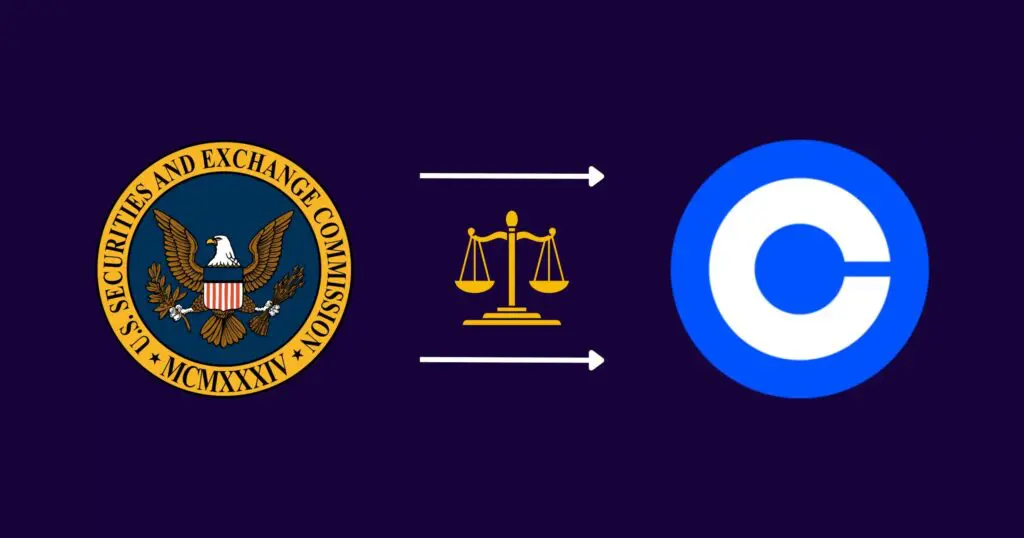A federal judge granted Coinbase an oral argument for its motion for judgment on SEC pleadings. Coinbase claims that staking services are not investment contracts and digital assets are not securities, dismissing the action.

Coinbase, the largest crypto exchange in the U.S., has secured an opportunity to present its case against the U.S. Securities and Exchange Commission (SEC) in court.
A federal judge has approved Coinbase’s request for an oral argument concerning its motion for judgment on the pleadings, which seeks to dismiss the SEC’s lawsuit against the exchange.
The SEC’s lawsuit against Coinbase
The SEC filed a lawsuit against Coinbase, alleging that they violated securities laws by offering a staking service for Lend tokens.
The SEC claimed that Lend tokens are securities and that Coinbase didn’t properly register them or seek an exemption. They also accused Coinbase of misleading investors about the risks and rewards of staking Lend tokens.
Coinbase denied these allegations, arguing that Lend tokens are utility tokens for accessing the Lend protocol. They also stated that staking services are not investment contracts but a way for users to earn rewards by contributing to a blockchain network’s security.
Coinbase believes the SEC’s lawsuit is based on an overly broad interpretation of securities laws that doesn’t apply to digital assets.
The motion for judgment on the pleadings
In October, Coinbase filed a motion for judgment on the pleadings, asking the court to rule in its favor based on the facts and legal arguments presented in the pleadings.
Coinbase claimed that there is no genuine dispute of material fact and that it is entitled to judgment as a matter of law.
Coinbase presented four reasons why the court should dismiss the SEC’s lawsuit:
- The SEC has not alleged any facts that show that Lend tokens are securities or that staking services are investment contracts.
- The SEC has not provided any clear or consistent guidance on how to determine whether digital assets are securities or not.
- The SEC has not given fair notice to Coinbase or other market participants about its regulatory expectations or enforcement actions.
- The SEC’s lawsuit violates Coinbase’s constitutional rights to due process and free speech.
The oral argument set for January 17
On October 25, Judge Katherine Polk Failla of the U.S. District Court for the Southern District of New York granted an order approving Coinbase’s request for an oral argument concerning its motion for judgment on the pleadings.
The judge scheduled the oral argument for January 17, 2024, at 10:00 a.m. in New York.
The order stated:
“In light of the Court’s substantial trial and hearing calendar for the remainder of this year, the parties are hereby ORDERED to appear for oral argument on January 17, 2024, at 10:00 a.m. in Courtroom 618 of the Thurgood Marshall Courthouse, 40 Foley Square, New York, New York.”
The order also instructed the parties to file a joint submission on schedule before November 17, outlining their proposed format and duration of the oral argument, as well as any other issues they wish to raise.
Coinbase’s chief legal officer, Paul Grewal, announced the news on X, expressing his appreciation for the court’s swift attention and eagerness to answer the court’s questions.
The implications of the case
The case between Coinbase and the SEC is one of the most significant legal battles in the crypto industry, as it could have far-reaching implications for the regulation and innovation of digital assets in the U.S.
The case could also set a precedent for other crypto exchanges and platforms that offer similar services or products.
The crypto industry and lawmakers have criticized the SEC’s regulation-by-enforcement approach, which they claim creates uncertainty and stifles innovation.
They have also called for more clarity, collaboration from the SEC, and legislative action from Congress to provide a clear and consistent framework for crypto regulation.
